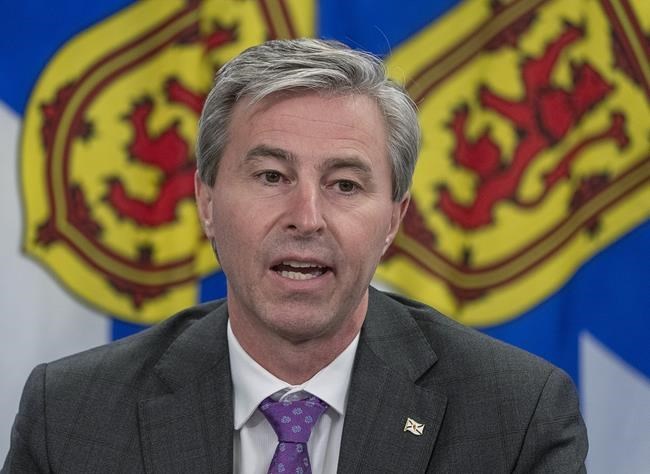HALIFAX ŌĆö The Omicron variant of the novel coronavirus has reached all four Atlantic provinces, after Newfoundland and Labrador on Wednesday confirmed its first case of the mutation believed to be more infectious than Delta.
But unlike the other three provinces, Newfoundland and Labrador did not make a link between its case of Omicron and the COVID-19 outbreak at a university in Nova Scotia. Dr. Janice Fitzgerald, chief medical officer of health, said the source of the infection has been linked to travel within Canada.
"It spreads more easily from person to person," Fitzgerald said of the new variant. "While Delta is still the predominant strain in Canada, it is likely only a matter of time before Omicron replaces it."
Noting that COVID-19 cases are climbing once again across the country, Fitzgerald told a news conference that anyone returning from a post-secondary institution outside the province must have a PCR test upon arrival or self-isolate for two weeks. In the coming days, the province will also begin providing all arriving travellers with a package of take-home rapid test kits, she added.
Fitzgerald said 13 new cases of COVID-19 had been identified in the province since Monday.
Omicron cases in both New Brunswick and Prince Edward Island have been tied to an early December outbreak at St. Francis Xavier University in Antigonish, N.S.
In Nova Scotia on Wednesday, officials reported 178 new COVID-19 cases and said six people were hospitalized with the disease, including two patients in intensive care.
On Tuesday, the province's Health Department linked a total of 344 positive cases to the university outbreak, which has resulted in tightened public health measures that will go into effect Friday. Restrictions include new indoor and outdoor gathering limits.
Nova Scotia officials also announced Wednesday that most public school students will start their holiday break early, with no classes after Friday. The move came after officials announced last week that the holiday break would be extended by two days to Jan. 6.
Meanwhile, the Halifax Mooseheads junior hockey team said Wednesday they were sticking to their plan to advance one of their home games to avoid the new cap on gathering limits imposed by the province. Team spokesman Scott MacIntosh said in an email the home game scheduled for Friday at the Scotiabank Centre would instead be played on Thursday. A game set for Wednesday night would also take place, he added.
Premier Tim Houston has criticized the decision by the Quebec Major Junior Hockey League team. Houston said Tuesday he gave advance notice about Friday's new gathering limits to allow people to prepare, not to "get in front of the changes."┬Ā
Starting Friday, organized gatherings such as sports and cultural events will be capped at 50 per cent capacity, to a maximum of 150 people indoors. Private indoor gatherings will be limited to 20 people.┬Ā
In New Brunswick, Health Minister Dorothy Shephard confirmed Wednesday that the province had discovered 11 new Omicron cases, bringing the province's total to 14. The minister reported 160 new cases of COVID-19, and as of Wednesday, the province was dealing with 1,114 active cases, including 42 in hospital ŌĆö 14 of those in intensive care.
Shephard also announced the province was taking steps to keep schoolchildren safe by introducing a "holiday testing blitz." All of the province's school-aged students ŌĆö from kindergarten to Grade 12 ŌĆö will be provided with rapid test kits to be used at home over the holidays.┬Ā
"These tests will help us quickly identify new infections and slow the spread," Shephard told a news conference in Fredericton.
Shephard said only 31 per cent of the province's children between the ages of five and 11 have received their first dose of COVID-19 vaccine. As of Wednesday, young children and teens accounted for the largest group of new daily infections, she added.
"It has been a challenge to slow the rate of infection among this group," Shephard said.
Also on Wednesday, New Brunswick's education minister, Dominic Cardy, announced a detailed plan for preventing the spread of the virus in schools and child-care facilities through the winter months.
"This is about managing risks and adding layers of protection," Cardy said as he announced the changes, which will take effect when school resumes Jan. 10 after the Christmas break and will be aligned with the province's COVID-19 alert system.
Prince Edward Island health officials announced 11 new COVID-19 cases Wednesday. They said the cases are linked to either travel outside the province, close contacts of previous cases or identified public exposure sites. There are currently 43 active cases in the province.
This report by The 91įŁ┤┤ Press was first published Dec. 15, 2021.
ŌĆö With files from Sarah Smellie in St. John's, N.L., and Michael MacDonald in Halifax.
Keith Doucette, The 91įŁ┤┤ Press



